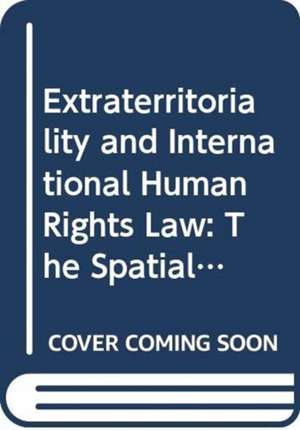Extraterritoriality and International Human Rights Law: The Spatial Reach of African Human Rights Treaties: Routledge Research in Human Rights Law
Autor Takele Soboka Bultoen Limba Engleză Hardback – 5 ian 2026
This book examines the corpus and jurisprudence of the regional African human rights treaties in the light of international treaty and case laws. It explores the textual bases of African human rights instruments in order to gauge the possibility of the treaties’ extraterritorial scope where human rights are breached by both State and non-State actors. The question of whether the scope of application of regional treaties is circumscribed by relevant state’s territory or jurisdiction and the victim’s nationality or residence is considered, in reference to human and peoples’ rights, states’ duties and remedies. The case law of the African Commission, the African Committee of Experts on the Rights and Welfare of the Child and the African Court on Human and People’s Rights is analysed as well as sub regional tribunals such as the SADC and the ECOWAC tribunals. The book also looks at the implications of the ‘jurisdiction’ clause inserted in the relatively new African treaty the Protocol establishing the African Court on Human Rights and Justice. The jurisprudence of the UN and regional human rights bodies is referred to in order to appraise the possibility of drawing analogies and use the experiences of those ‘foreign’ human rights systems in a way and to the extent the African region can borrow from them.
Din seria Routledge Research in Human Rights Law
-
 Preț: 327.10 lei
Preț: 327.10 lei -
 Preț: 327.55 lei
Preț: 327.55 lei -
 Preț: 311.18 lei
Preț: 311.18 lei -
 Preț: 309.90 lei
Preț: 309.90 lei - 9%
 Preț: 936.57 lei
Preț: 936.57 lei -
 Preț: 328.25 lei
Preț: 328.25 lei - 8%
 Preț: 388.57 lei
Preț: 388.57 lei -
 Preț: 384.92 lei
Preț: 384.92 lei -
 Preț: 386.22 lei
Preț: 386.22 lei -
 Preț: 312.02 lei
Preț: 312.02 lei -
 Preț: 326.49 lei
Preț: 326.49 lei - 20%
 Preț: 268.89 lei
Preț: 268.89 lei -
 Preț: 281.27 lei
Preț: 281.27 lei -
 Preț: 318.31 lei
Preț: 318.31 lei -
 Preț: 341.57 lei
Preț: 341.57 lei - 18%
 Preț: 1167.58 lei
Preț: 1167.58 lei - 18%
 Preț: 1058.38 lei
Preț: 1058.38 lei - 18%
 Preț: 1058.65 lei
Preț: 1058.65 lei - 18%
 Preț: 1056.28 lei
Preț: 1056.28 lei - 28%
 Preț: 822.34 lei
Preț: 822.34 lei - 18%
 Preț: 1168.40 lei
Preț: 1168.40 lei - 25%
 Preț: 823.63 lei
Preț: 823.63 lei -
 Preț: 371.64 lei
Preț: 371.64 lei -
 Preț: 473.88 lei
Preț: 473.88 lei - 18%
 Preț: 1110.92 lei
Preț: 1110.92 lei -
 Preț: 365.54 lei
Preț: 365.54 lei -
 Preț: 464.16 lei
Preț: 464.16 lei - 18%
 Preț: 1169.97 lei
Preț: 1169.97 lei - 25%
 Preț: 824.17 lei
Preț: 824.17 lei - 18%
 Preț: 1118.67 lei
Preț: 1118.67 lei - 18%
 Preț: 1057.57 lei
Preț: 1057.57 lei - 18%
 Preț: 1061.06 lei
Preț: 1061.06 lei - 18%
 Preț: 1111.58 lei
Preț: 1111.58 lei - 18%
 Preț: 1057.75 lei
Preț: 1057.75 lei - 18%
 Preț: 1109.18 lei
Preț: 1109.18 lei - 18%
 Preț: 1061.57 lei
Preț: 1061.57 lei -
 Preț: 475.16 lei
Preț: 475.16 lei - 26%
 Preț: 847.31 lei
Preț: 847.31 lei - 18%
 Preț: 1059.48 lei
Preț: 1059.48 lei - 18%
 Preț: 1060.52 lei
Preț: 1060.52 lei -
 Preț: 414.32 lei
Preț: 414.32 lei - 18%
 Preț: 1053.92 lei
Preț: 1053.92 lei -
 Preț: 423.30 lei
Preț: 423.30 lei
Preț: 597.72 lei
Preț vechi: 801.64 lei
-25% Nou
Puncte Express: 897
Preț estimativ în valută:
114.37€ • 124.63$ • 96.38£
114.37€ • 124.63$ • 96.38£
Carte nepublicată încă
Doresc să fiu notificat când acest titlu va fi disponibil:
Se trimite...
Preluare comenzi: 021 569.72.76
Specificații
ISBN-13: 9780415823708
ISBN-10: 0415823706
Pagini: 224
Dimensiuni: 156 x 234 mm
Ediția:1
Editura: Taylor & Francis
Colecția Routledge
Seria Routledge Research in Human Rights Law
Locul publicării:Oxford, United Kingdom
ISBN-10: 0415823706
Pagini: 224
Dimensiuni: 156 x 234 mm
Ediția:1
Editura: Taylor & Francis
Colecția Routledge
Seria Routledge Research in Human Rights Law
Locul publicării:Oxford, United Kingdom
Public țintă
PostgraduateCuprins
1. The Approach of a ‘Foreign’ Right-Holder 2. The Conceptual (In)congruence of Human Rights and States’ Duties 3. Extraterritoriality in African Instruments 4. Extraterritoriality through Regional Jurisprudence 5. Extraterritoriality and the Role of the Cross-Reference Provisions 6. Extraterritoriality and Indivisible Justiciability 7. Problems of ‘Jurisdiction’ Clause in African Court Protocol 8. Extraterritoriality: The Dichotomy of Private-Public Duties 9. Conclusion
Descriere
This book explores the extraterritorial application of human rights in Africa. It examines the corpus and jurisprudence of the regional African human rights treaties in the light of international treaty and case laws in order to gauge the possibility of the treaties’ extraterritorial scope.
